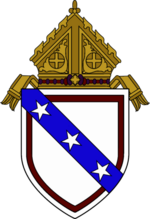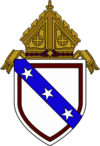Roman Catholic Diocese of Richmond
Diocese of Richmond Dioecesis Richmondiensis | |
|---|---|
 Cathedral of the Sacred Heart | |
 Coat of arms | |
| Location | |
| Country | United States |
| Territory | Central and Southern Virginia, as well as the Eastern Shore of Virginia |
| Ecclesiastical province | Baltimore |
| Metropolitan | Baltimore |
| Statistics | |
| Area | 36,711 sq mi (95,080 km2) |
| Population - Total - Catholics | (as of 2015) 4,942,100 236,061 (4.7%) |
| Parishes | 142 |
| Schools | 28 |
| Information | |
| Denomination | Catholic Church |
| Rite | Roman Rite |
| Established | July 11, 1820 (204 years ago) |
| Cathedral | Cathedral of the Sacred Heart |
| Patron saint | St. Vincent de Paul |
| Current leadership | |
| Pope | Francis |
| Bishop | Barry C. Knestout |
| Metropolitan Archbishop | William E. Lori |
| Map | |
 | |
| Website | |
| www.richmonddiocese.org | |
The Roman Catholic Diocese of Richmond (Latin: Dioecesis Richmondiensis) is an episcopal see or diocese of the Roman Catholic Church in the United States. Its current territory encompasses all of central and southern Virginia, Hampton Roads, and the Eastern Shore. It is a suffragan diocese of the metropolitan Archdiocese of Baltimore, from which its territory was taken, and is a constituent of the ecclesiastical province of Baltimore.
As of 2018, there were 241,276 Catholics and 142 parishes that are part of the Diocese of Richmond. The diocese currently has 91 active priests, 41 retired priests, 140 permanent deacons, 7 religious brothers, 181 religious sisters of Catholic religious orders and 31 seminarians serving 139 parishes. There are 28 diocesan Catholic schools in the diocese, with a total enrollment of 8,827 students in 5 high schools and 22 elementary schools.[1]
The diocese's current Bishop is Barry C. Knestout, who was appointed by Pope Francis on December 5, 2017.[2] He was installed to the position on January 12, 2018.[3]
History

Prior to the American Revolution, few Catholics lived in colonial Virginia. Attempts to found Catholic settlements in Virginia were made by Lord Baltimore in 1629, and Captain George Brent in 1687. In the spring of 1634 Father John Altham, a Jesuit companion of Father Andrew White, the Maryland missionary, laboured amongst some of the Virginia tribes on the south side of the Potomac. Stringent laws were soon enacted in Virginia against Catholics. In 1687 Fathers Edmonds and Raymond were arrested at Norfolk for exercising their priestly functions. During the last quarter of the eighteenth century the few Catholic settlers at Aquia Creek, near the Potomac, were attended by Father John Carroll and other Jesuit missionaries from Maryland.[4]
It was not until the passage of Thomas Jefferson's Virginia Statute for Religious Freedom in 1786 that Catholics were free to worship openly in the commonwealth. Rev. Jean Dubois, afterwards third Bishop of New York, accompanied by a few French priests and with letters of introduction from Lafayette to several prominent Virginia families, came to Norfolk in August, 1791, where he laboured a few months. Proceeding to Richmond towards the end of the year, he offered in the courtroom of the new State House, by invitation of the General Assembly, the first Mass ever said in the Capital City.[4] James Monroe served as his host until Father Dubois rented a house in Richmond near a major bridge and opened a school to teach French, classics and arithmetic.[5] Patrick Henry helped the priest learn English. For two years Dubois mostly celebrated mass in rented rooms or at the homes of the town's few Catholic families.[6]
According to tradition, at an early date, probably at the time of the Declaration of Independence, Alexandria had a log chapel with an unknown resident priest. Rev. John Thayer of Boston was stationed there in 1794. Rev. Francis Neale, who in 1796 constructed at Alexandria a brick church, erected fourteen years later a more suitable church where Fathers Anthony Kohlmann, and Benedict Joseph Fenwick, afterwards second Bishop of Boston, frequently officiated. About 1796 Rev. James Bushe began the erection of a church at Norfolk. He was succeeded by were the Very Rev. Leonard Neale, afterwards Archbishop of Baltimore. The Diocese of Richmond was canonically erected by Pope Pius VII on July 11, 1820.[4]
The new Diocese of Wheeling was formed by splitting off the western part of this diocese in 1850, and that same year, this diocese received the small area which had been retroceded from the District of Columbia in 1846. The Civil War led to formation of the state of West Virginia, but the boundary between that state and Virginia did not coincide with the boundary of the Wheeling and Richmond dioceses. The two eastern-shore counties were transferred to the new Diocese of Wilmington in 1868, leaving Virginia split between three dioceses. In 1974, Virginia and West Virginia dioceses were realigned so that West Virginia was a diocese by itself and Virginia had the Richmond diocese and the new Arlington diocese, both in their entirety.
On February 13, 2019 Bishop Knestout released a list of 42 priests who had "credible and substantiated" accusations of sexual abuse made against them. The list covers allegations dating from the 1950s to the most recent substantiated allegation in 1993.[7][8] Among those listed was future Bishop of Memphis, Carroll Dozier was accused of committing acts of sex abuse while serving in the Diocese of Richmond.[9]
The Diocese of Richmond has seen an increase in the number of seminarians preparing for the priesthood.[when?] According to Rev. Michael Boehling, the typical candidate is in his early to mid-20s, and college graduate with a degree in history, science or mathematics. "They are articulate and bright, well-rounded individuals who are mature for their age,"[10]
Bishops
Bishops of Richmond
- Patrick Kelly (1820–1822), appointed Bishop of Waterford and Lismore
- Richard Vincent Whelan (1841–1850), appointed Bishop of Wheeling
- John McGill (1850–1872)
- James Gibbons (1872–1877), appointed Archbishop of Baltimore (elevated to Cardinal in 1886)
- John Joseph Keane (1878–1888), appointed Rector of The Catholic University of America and Archbishop of Dubuque
- Augustine Van de Vyver (1889–1911)
- Denis Joseph O'Connell (1912–1926)
- Andrew James Louis Brennan (1926–1945)
- Peter Leo Ireton (1945–1958)
- John Joyce Russell (1958–1973)
- Walter Francis Sullivan (1974–2003)
- Francis Xavier DiLorenzo (2004–2017)
- Barry Christopher Knestout (2018–present)
Auxiliary bishops
- Joseph Howard Hodges (1952–1961), appointed Bishop of Wheeling
- Ernest Leo Unterkoefler (1962–1964), appointed Bishop of Charleston
- James Louis Flaherty (1966–1975)
- Walter Francis Sullivan (1970–1974), appointed Bishop here
- David Edward Foley (1986–1994), appointed Bishop of Birmingham
Other priests of this diocese who became bishops
- Francis Janssens, appointed Bishop of Natchez in 1881 and later Archbishop of New Orleans
- Vincent Stanislaus Waters, appointed Bishop of Raleigh in 1945
- Carroll Thomas Dozier, appointed Bishop of Memphis in 1970
- Antons Justs (priest here, 1962-1974), appointed Bishop of Jelgava, Latvia in 1995
Notable people
- Servant of God Francis J. Parater (1897–1920), seminarian and candidate for canonization
Knights of Columbus
The Knights of Columbus has several councils in the Richmond Diocese. The Knights serve parish and communities throughout both dioceses in the Commonwealth. One of the best known services is the KOVAR drive which raises money for assisting Virginians with intellectual disabilities.[11]
High schools
- Benedictine College Preparatory, Richmond
- Blessed Sacrament Huguenot Catholic School, Powhatan
- Catholic High School, Virginia Beach
- Holy Cross Regional Catholic School, Lynchburg (Closed)
- Peninsula Catholic High School, Newport News
- Roanoke Catholic School, Roanoke
- Saint Gertrude High School, Richmond
- Walsingham Academy, Williamsburg
See also
- Historical list of the Catholic bishops of the United States
- List of Catholic bishops of the United States
- List of the Catholic dioceses of the United States
- List of Roman Catholic archdioceses (by country and continent)
- List of Roman Catholic dioceses (alphabetical) (including archdioceses)
- List of Roman Catholic dioceses (structured view) (including archdioceses)
References
- ^ "Diocesan Statistics", Diocese of Richmond
- ^ "Bishop Barry Knestout tapped to lead the diocese of Richmond". Retrieved 2017-12-05.
- ^ "Bishop-designate Barry C. Knestout". Retrieved 2017-12-05.
- ^ a b c Magri, Francis Joseph. "Diocese of Richmond", The Catholic Encyclopedia Vol. 13. New York: Robert Appleton Company, 1912. 27 June 2019
 This article incorporates text from this source, which is in the public domain.
This article incorporates text from this source, which is in the public domain.
- ^ Fogarty, Gerald, Commonwealth Catholicism: a history of the Catholic Church in Virginia (University of Notre Dame Press, 2001) pp. 25-36
- ^ Hayes, Patrick. "John Dubois." The Catholic Encyclopedia. Vol. 5. New York: Robert Appleton Company, 1909. 26 Aug. 2014
 This article incorporates text from this source, which is in the public domain.
This article incorporates text from this source, which is in the public domain.
- ^ "Virginia's two dioceses release lists of clergy credibly accused of abuse". Catholic News Herald. Roman Catholic Diocese of Charlotte. 15 February 2019. Retrieved 16 February 2019.
- ^ Poulter, Amy. "Richmond Catholic diocese publishes list of 42 priests with 'credible' abuse allegations", Daily Press, February 14, 2019
- ^ https://www.kait8.com/2019/02/19/former-memphis-bishop-accused-sexual-abuse/
- ^ Sheler, Jeff. "Catholic Diocese of Richmond rebounds from past", The Virginian-Pilot, October 20, 2013
- ^ "KOVAR". Virginia Knights of Columbus. Retrieved 2016-02-29.
![]() This article incorporates text from a publication now in the public domain: Herbermann, Charles, ed. (1913). "Diocese of Richmond". Catholic Encyclopedia. New York: Robert Appleton Company.
This article incorporates text from a publication now in the public domain: Herbermann, Charles, ed. (1913). "Diocese of Richmond". Catholic Encyclopedia. New York: Robert Appleton Company.
External links
- Roman Catholic Diocese of Richmond
- Roman Catholic dioceses in the United States
- Roman Catholic Ecclesiastical Province of Baltimore
- Catholic Church in Virginia
- Religious organizations established in 1820
- Culture of Richmond, Virginia
- Roman Catholic dioceses and prelatures established in the 19th century
- 1820 establishments in Virginia

